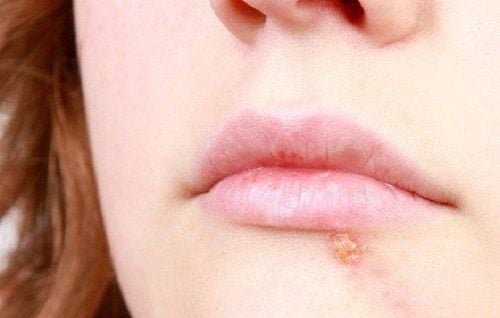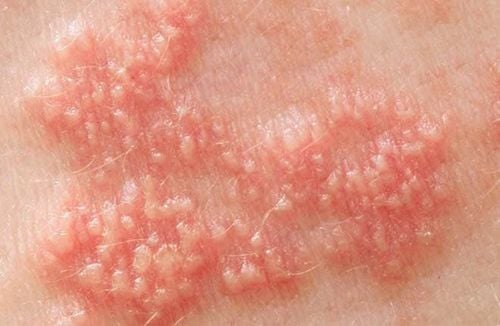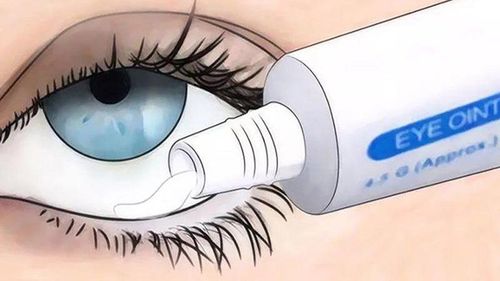This is an automatically translated article.
The article was professionally consulted by Doctor Nguyen Ba Hung - Reproductive Support Center - Vinmec Times City International General Hospital.Genital herpes, also known as genital herpes, is an infection of the genital tract caused by the Herpes Simplex virus (HSV). When the virus enters the body, it will cause many negative effects on the health of the patient, so experts recommend that you learn carefully about genital herpes to take measures to prevent and handle it. need. So what is genital herpes? To understand the causes, symptoms and treatment of genital herpes, please read through the sharing below.
1. What is genital herpes?
Genital herpes is a sexually transmitted disease (STDs). An HSV infection can cause sores and blisters around the lips, genitals, or anus. Sometimes, an HSV infection doesn't cause sores, or you have an HSV infection but don't notice it. Genital herpes is a difficult disease to treat, but there are certain medications that can shorten the time it takes for the lesions to come back and make it less severe or even prevent it from happening.
2. What viruses can cause genital herpes?
There are two types of HSV that can cause genital herpes: HSV-1 and HSV-2. The most common cause of genital herpes is HSV-2. HSV-1 commonly causes sores that appear on the mouth, lips, and eyes, which are becoming more and more common, especially in young women.
According to statistics in the United States, at least 50 million people, including about 1⁄6 adults, are infected with HSV. Genital herpes is more common in women than in men.
3. How is the herpes virus transmitted?
HSV is spread by direct contact with herpes sores, usually during vaginal, oral, or anal sex. HSV can also be present on the skin even in the absence of sores. If a person comes into contact with the virus on an infected person's skin, that person can also become infected.
After a person is first infected, HSV stays in the body. It travels to nerve cells near the spine and stays there until the body's immune system makes a mistake and starts working again. When this happens, the virus then travels along the nerves, back to where it first entered the body and causes new outbreaks of sores and blisters. This is a relapse. The virus can be passed on to others during relapse.

4. How soon will symptoms appear after being infected with the herpes virus?
When a person is first infected with HSV, symptoms appear about 2 to 10 days after the virus enters the body.
What are the symptoms of the first herpes outbreak?
At first, there may be flu-like symptoms, fever, chills, muscle aches, fatigue and nausea. The sores appear as small, fluid-filled blisters on the genitals, buttocks, or other areas. The sores are often clustered, and the area where the sores appear will be swollen and painful. If the sore is on your genitals, you will have a stinging or burning sensation when you urinate.
The first outbreak of genital herpes can last 2 to 4 weeks. During this time, the sores break open and release fluid. After a while, the sores will dry and heal without scarring.
What are the symptoms of recurrent herpes?
When the illness is about to happen again, you will have a burning, itching or tingling sensation near where the virus entered the body. There are also symptoms such as pain in the back, buttocks, thighs, or knees. A few hours later, sores may appear. During recurrent episodes, there is usually no fever or swelling in the genital area. The sores will heal faster within 3 to 7 days. Also, a relapse is usually less painful than the first. Outbreaks occur most often during the first year after infection. For many people, the number of relapses will decrease over time.
How is genital herpes diagnosed?
To diagnose biological herpes, doctors will take a sample of fluid from your sore, then test it to see if it contains the virus and if so, what type of HSV it is. In the absence of ulcers, you can do a blood test. These tests detect the antibodies the body makes to fight the virus. Blood tests can also identify types of HSV.
5. How to inhibit genital herpes?
Using antiviral drugs can shorten the duration and severity of an outbreak. Daily use can reduce the number of relapses. This is called suppressive therapy. In some cases, suppressive therapy can suppress flare-ups for a long time. It also reduces the risk of transmitting herpes from an infected person to others.Measures to reduce the risk of transmitting the herpes virus to a sexual partner:
If you have genital herpes, you need to take the following steps to avoid transmitting HSV to your partner:
Tell your partner that you have herpes genitalia before having sex. It is possible to pass HSV to others even if you do not have sores. Viruses can appear on the skin before and after an outbreak. Using condoms can reduce the risk of getting HSV, but they do not provide complete protection. Areas of skin that have the virus but are not covered by a condom can be contagious. Suppressive therapy can reduce the risk of transmitting the disease to a sexual partner. Be on the lookout for ulcer symptoms. Avoid sexual contact from the time you feel these symptoms appear until a few days after the scabs disappear. Wash hands with soap and water after possible contact with sores. This will keep you from re-infecting yourself or spreading the virus to others.
6. How can the herpes virus affect pregnancy?
If a woman is pregnant and infected with HSV, it can be passed to the fetus during delivery (when passing through the infected woman's reproductive tract). The risk of transmission is also very high if the mother is first infected with HSV during pregnancy or has her first outbreak late in pregnancy. However, it can also occur during a recurrent outbreak if the mother is infected before becoming pregnant, but the risk of transmission is much lower.
If there are sores or warning signs of an outbreak at the time of delivery, you may need a cesarean section to reduce the risk of infection. The decision depends on many factors, including the sores on your body and whether your unborn baby was exposed to them during birth.
Is it possible to breastfeed if the mother is infected with the herpes virus?
Herpes virus cannot be passed to a baby through breast milk. However, a baby can become infected by touching a sore on your body. Make sure any sores the baby may come into contact with are covered while holding the baby or while breastfeeding. Wash your hands with soap and water before and after feeding your baby. If a mother has sores on her breast, she should not breastfeed from that breast.
Package of Social Diseases Examination and Screening of Vinmec International General Hospital helps customers to screen for social diseases in order to detect diseases early for effective treatment and avoid complications.
Please dial HOTLINE for more information or register for an appointment HERE. Download MyVinmec app to make appointments faster and to manage your bookings easily.














